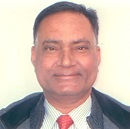
Virinder Parmar
Professor
The City University of New York
USA
Biography
Virinder Parmar, born on 2nd November 1948 at Allahabad (India) is a Naturalized US Citizen. He did B.Sc. Honors, M.Sc. and Ph.D. from the University of Delhi (India), and has worked for nearly 10 years as a Postdoctoral/Visiting Scientist at Cornell University, Harvard University, University of Massachusetts Lowell (UML), NYU-Poly and MIT (USA); the University of Basel (Switzerland) and the Imperial College of Science, Technology and Medicine (London, UK). He has been a faculty at St. Stephen’s College and the University of Delhi for 44 years, he recently retired as Full Professor of Chemistry and has served as Head of the Department of Chemistry and as Chairman of the Board of Research Studies, and Provost of Gwyer Hall at this University. He has been a Visiting Full Professor at the Institute of Nanoscience and Nanomedicine (INSET), University of Massachusetts Lowell (UML, USA) from March 2001 to December 2005, an Honorary Professor of Organic Chemistry at the University of Southern Denmark (SDU) since March 2008, a Visiting Professor at Indiana University-Purdue University (IUPUI, Indianapolis, USA) in May-June 2015, an Adjunct Professor at Long Island University, Brooklyn (LIU, New York, USA) in January-April 2013, a Visiting Professor at the Institute of Advanced Sciences, Dartmouth (INADS, MA, USA) since November 2016 and a Visiting Professor at the Central University of Haryana (CUH, India) since February 2016. He was appointed Full Tenured Professor of Chemistry & First Head of the Department of Nanoscience of the newly formed Joint School of Nanoscience & Nanoengineering (JSNN) at the University of North Carolina Greensboro (UNCG, USA). He has been an awardee of Medals for Excellence in Research from the Chemical Research Society of India (CRSI, Bangalore) for the year 2001 and of the Indian Society of Chemists and Biologists (ISCB, Lucknow) for the year 2009. He has been a recipient of the Academic Staff Award from the EXPERTS II Consortium of the European Union (EU) in December 2012 and April 2013.
Research Interest
Professor Parmar’s research interests include: Green/Sustainable Chemistry, Nanotechnology, Organic Synthesis, Nucleic Acid Chemistry, Advanced Materials, Medicinal Chemistry, Biocatalysis and the Chemistry of Natural Products. He has mentored 85 Ph. D. and Postdoctoral Scientists in several Belgian, British, Canadian, Danish, Dutch, French, German, Indian and US Universities, and has published 492 research papers (in 2018: 7; in 2017: 7; in 2016: 11) in journals of high repute (published by ACS, RSC, Elsevier, Wiley, VCH, MDPI, Springer, Thieme, etc.; h-Index: 43/35; Citation Index: 47.26; Number of Citations: 8,300; Number of Reads: 169,000; Number of Readers: 4,200) in addition to being co inventor on 21 Patents and having co-authored six Books & Edited six special Issues of Journals. He has handled thirty two research projects involving grants of nearly US Dollars 11.60 million obtained from various agencies and corporations in USA, UK, Germany, Denmark, Italy and India in international collaboration with twenty six research groups in USA, UK, Russia, Italy, India, Germany, France, Sweden, Canada, Denmark, Bulgaria, Czech Republic, The Netherlands and Belgium. He has organized 26 conferences/symposia/seminars/workshops/colloquia in the areas of his research interests. He has delivered Invited / Plenary Lectures at 147 international meetings and has given 398 Research Seminars at 293 Institutions in 31 Countries across the Globe. He is the Executive Editor of the Journal 'Biocatalysis and Biotransformation', and has been on the Editorial Boards of the Journals: ChemSusChem, Mendeleev Communications, Indian Journal of Chemistry, Natural Product Communications, Arkivoc, Molecules and ISRN Medicinal Chemistry. He is a regular reviewer for several journals published by the American Chemical Society, the Royal Society of Chemistry (London), Elsevier & Wiley-VCH, etc., and is a member of the IUPAC’s Subcommittee on Biomolecular Chemistry and the Interdivisional Committee on Green Chemistry for Sustainable Development (ICGCSD).

